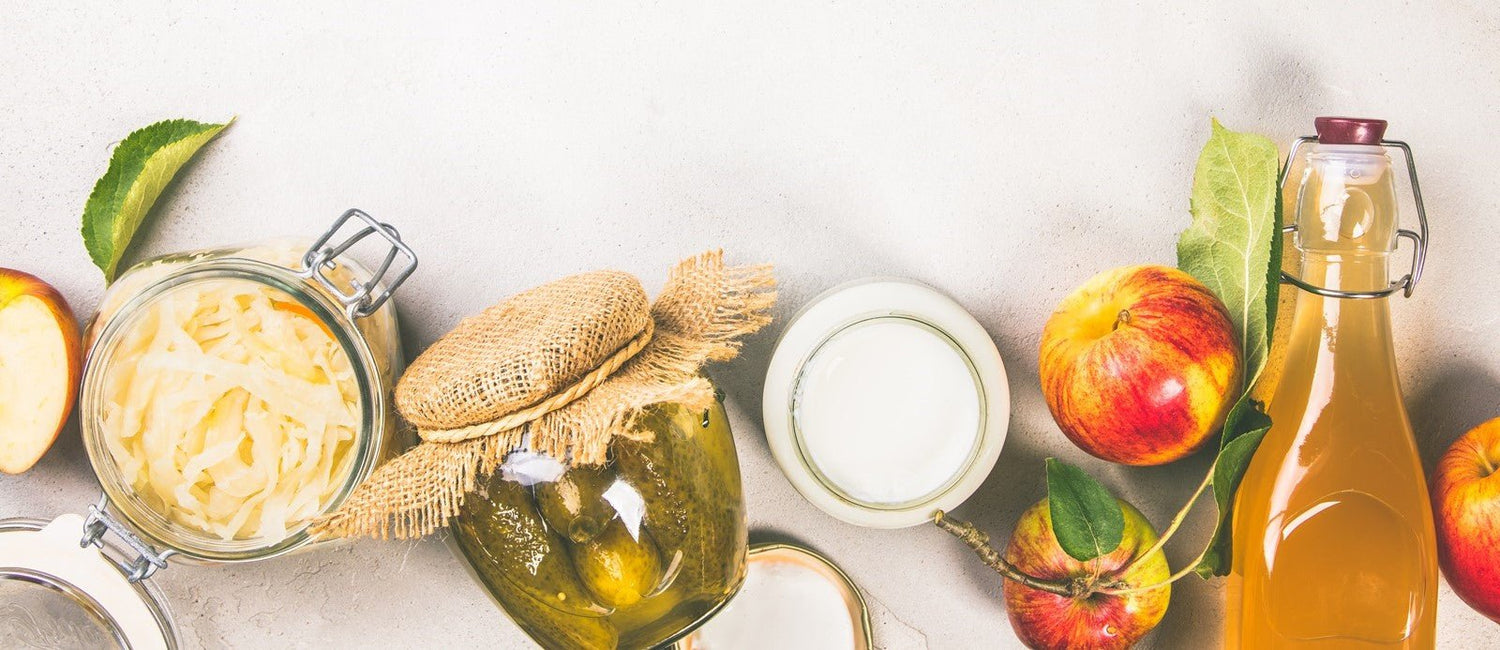The microbiome, the diverse community of microorganisms that colonize our bodies, has become a fascinating field of research that reveals an impressive range of effects on our health and well-being. Amidst this microcosm of microorganisms, the interest in probiotics has been growing in recent years.
What are probiotics and what are their effects?
The Food and Drug Administration (FDA) and the World Health Organization (WHO) define probiotics as “live microorganisms that, when administered in sufficient quantity, provide health benefits to the host.” The most used probiotics belong to the genus Lactobacillus, Bacillus, Bifidobacterium, and Saccharomyces. The dose indication in probiotic supplements is always given in “colony forming units (cfu)”. This describes the number of living and active microorganisms in one serving in a probiotic supplement.
There are several known potential mechanisms of action for probiotics, but the effect depends on the bacterial genus or species. Mechanisms include, modulation of the immune system, direct interaction with the gut microbiome, support of barrier function, and production of short-chain fatty acids, enzymes, and molecules with systemic effects such as neurotransmitters.(1)
 Potential mechanisms of action of probiotics (1)
Potential mechanisms of action of probiotics (1)
How do probiotics affect our health?
Probiotics can improve immune function by stimulating B cells to produce IgA. They also affect signaling pathways of pro- and anti-inflammatory cytokines that modulate immune function. Some probiotics, such as Streptococcus and Lactobacillus can reduce pro-inflammatory cytokines such as TNF-alpha and interleukin-6, while others increase the production of anti-inflammatory cytokines like interleukin-10 or TGF-beta. Further, probiotics affect barrier function in the gut, as some probiotic bacteria increase the production of mucins and tight-junction proteins, which are important for maintaining gut barrier function.(2)
Probiotic bacteria belonging to the genus Bifdobacterium and Lactobacillus produce lactic acid and acetic acid, as primary end products of carbohydrate metabolism. Various in situ model systems showed that these organic acids lower the pH in the lumen and inhibit the growth of pathogenic microorganisms. Lactobacillus and Bifidobacterium do not produce butyrate, but feeding other commensal bacteria, such as Faecalibacterium , may increase the levels of butyrate and other short-chain fatty acids in the gut. This can affect various aspects of physiology and is connected to improved insulin response.(3)
"The interactions through the gut-brain axis, also give the possibility of the use of probiotics here."
There is growing evidence that the state of our gut microbiome has an impact on mental health. The interactions through the gut-brain axis, also give rise to the possibility of using probiotics here. Irritable bowel syndrome (IBS) is a complex condition that can cause a variety of symptoms, including abdominal pain, bloating, diarrhea, or constipation. The exact cause of IBS Is not yet fully understood, however, the gut-brain axis is also important in this case.(4) Studies have shown that Lactobacillus plantarum can help with IBS symptoms such as bloating and abdominal pain.(5), (6)
The future of probiotics
As knowledge of the human microbiome and its functions continues to expand, the future holds several potential new probiotic bacteria, such as Roseburia intestinalis , Faecalibacterium prausnitzii , Eubacterium spp , Bacteroides spp., and A Akkermansia muciniphila .(7) These bacterial species have physiological functions not covered by Bifidobacterium or Lactobacillus species, such as the production of the short-chain fatty acids butyrate and propionate.[8] Akkermansia muciniphila has gained increasing interest because of its health-promoting effects and function in metabolic diseases, such as obesity and insulin resistance. For example, in a study in obese and insulin-resistant participants, supplementation with Akkermansia muciniphila showed increased insulin sensitivity.[9]
The mechanisms of action of probiotics are complex, heterogeneous, and mostly bacteria specific and not all mechanisms have been confirmed in human studies. Although many probiotics have been evaluated, there is still a need for better understanding, especially explanations of the structure and function of the observed health effects and long-term effects. More clinical studies are needed to confirm the beneficial effects of probiotics in the treatment of specific diseases.(10)
Note
This article is intended for informational purposes only and should not be construed as medical information or instructions. The recipes are intended for inspiration and are not intended as therapeutic measures. If you have any health problems, we recommend that you contact a doctor or other expert immediately.
References
- M. E. Sanders, D. J. Merenstein, G. Reid, G. R. Gibson, and R. A. Rastall, “Probiotics and prebiotics in intestinal health and disease: from biology to the clinic,” Nat Rev Gastroenterol Hepatol, vol. 16, no. 10, pp. 605–616, Oct. 2019, doi: 10.1038/s41575-019-0173-3.
- C. Mazziotta, M. Tognon, F. Martini, E. Torreggiani, and J. C. Rotondo, “Probiotics Mechanism of Action on Immune Cells and Beneficial Effects on Human Health,” Cells, vol. 12, no. 1. MDPI, Jan. 01, 2023. doi: 10.3390/cells12010184.
- S. Sanna et al., “Causal relationships among the gut microbiome, short-chain fatty acids and metabolic diseases,” Nature Genetics, vol. 51, no. 4. Nature Publishing Group, pp. 600–605, Apr. 01, 2019. doi: 10.1038/s41588-019-0350-x.
- E. Simon, L. F. Călinoiu, L. Mitrea, and D. C. Vodnar, “Probiotics, prebiotics, and synbiotics: Implications and beneficial effects against irritable bowel syndrome,” Nutrients, vol. 13, no. 6. MDPI, Jun. 01, 2021. doi: 10.3390/nu13062112.
- P. Ducrotté, P. Sawant, and V. Jayanthi, “Clinical trial: Lactobacillus plantarum 299v (DSM 9843) improves symptoms of irritable bowel syndrome,” World J Gastroenterol, vol. 18, no. 30, pp. 4012–4018, 2012, doi: 10.3748/wjg.v18.i30.4012.
- K. Niedzielin, H. Kordecki, and B. Birkenfeld, “A controlled, double-blind, randomized study on the efficacy of Lactobacillus plantarum 299V in patients with irritable bowel syndrome,” European journal of gastroenterology & hepatology, vol. 13, no. 10, p. 1143—1147, Oct. 2001, doi: 10.1097/00042737-200110000-00004.
- M. Cunningham et al., “Shaping the Future of Probiotics and Prebiotics,” Trends in Microbiology, vol. 29, no. 8. Elsevier Ltd, pp. 667–685, Aug. 01, 2021. doi: 10.1016/j.tim.2021.01.003.
- E. E. Blaak et al., “ Short chain fatty acids in human gut and metabolic health,” Beneficial Microbes , vol. 11, no. 5, pp. 411–455, Aug. 2020.
- C. Depommier et al., “Supplementation with Akkermansia muciniphila in overweight and obese human volunteers: a proof-of-concept exploratory study,” Nat Med, vol. 25, no. 7, pp. 1096–1103, Jul. 2019, doi: 10.1038/s41591-019-0495-2.
- J. Suez, N. Zmora, E. Segal, and E. Elinav, “The pros, cons, and many unknowns of probiotics,” Nature Medicine, vol. 25, no. 5. Nature Research, pp. 716–729, May 01, 2019. doi: 10.1038/s41591-019-0439-x.





